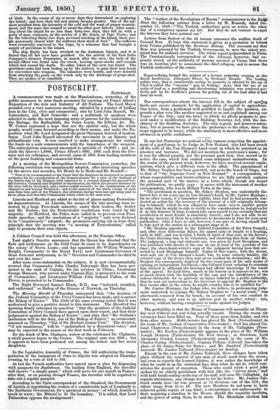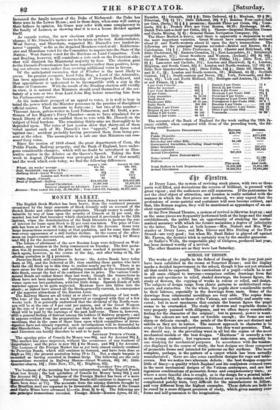Our correspondence attests the interest felt in the subject of
open:ng facile and secure channels for the application of capital to agriculture. One letter, from a gentleman well qualified to handle the question, ex- pounds a plan very like another suggested to us and explained among our Topics of the Day; only the letter to which we allude proposes to pro- ceed under a modification of the Building Societies Act, with the ma- chinery of the Building Societies. The idea is good, and deserves atten- tion; but at present we have given the preference to the other, since the scope appears to be larger, while the machinery is more effective and more advanced in public confidence.
In our last Postscript we noticed a City rumour respecting the appoint- ment of a gentleman to be Judge in New Zealand, who had been struck off the rolls of the Van Diemen's Land court in which he practised as an attorney and barrister. We did not mention the gentleman's name; for it was the official scandal, not the personal good luck, that moved us to notice the case, which had excited some indignant animadversion. In the course of the present week, however, we have received several expla- nations, which give a different turn to the affair. The appointment of Mr. Sidney Stephen has been gazetted, not as to the bench of Otago but to that of the Supreme Court in New Zealand." A correspondent, of whose respectability and trustworthiness we are fully satisfied, explains the personal part of the matter, in a letter which, though not meant for publication, we partly copy : it agrees with the statement of another correspondent, who was in Hobart Town at the time. "The gentleman in question, Mr. Sidney Stephen, was undoubtedly dis- barred five or six years ago in Van Diemen's Land, by Mr. Justice Montagu ; for no other reason, if I remember rightly, than that he had personally con- ducted an action for the recovery of the amount of a bill originally belong- ing to himself, which he was alleged to have made over to another person in order that he might be able to testify to the consideration he had given for it. At this distance of time, I cannot take upon myself to say certainly that my recollection of mere details is absolutely correct; and I am not able to re- fresh my memory of them by a reference to documents in time for your next publication : what I have to add, however, I am sure of, having myself had to take part in the matter in a subsequent stage of it. "Mr. Stephen appealed to the Judicial Committee of the Privy Council; and, after most distressing delays, his appeal came at length to a hearing, early in 1847; and was decided, I think in April of that year, in his favour; the Court directing him to be reinstated, and absolving him from all blame. The judgment, a long and elaborate one., was given by Lord Brougham, and was published with details of the case in one at least of the journals of the time • the short-hand-writer's copy of the judgment having been first cor- rected by Lord Brougham himself. Copies of this report, with the decree, were sent out to Van Diemen's Land; but, by some unlucky fatality, the attested copy of the decree thus sent never reached its destination ; and Mr. Stephen was consequently deprived for two years more of his only means of earning an independent livehhood,—the Colonial Court refusing to reinstate hittwithout it, although the Governor had official knowledge of the result of the appeal: for Lord Grey, much to his honour as it appears to me, was so much struck with the hardship of the ease and the insufficiency, of the redress obtainable for so grievous an injury inflicted by a public authority, that he sent out instructions to the Governor to appoint Mr. Stephen to the first vacant office in the colony he might consider him to be qualified for." Mr. Justice Montagu, the Judge who, we believe, in pronouncing judg- ment undertook to consign Mr. Sidney Stephen to "a moral tomb," was afterwards removed from the bench, on account of his own conduct in other matters, and sent to an inferior post in another colony: not, however, without having complaints to make against his judges.
The probability is that the House of Commons will assemble on Thura- day next without any seat being actually vacant. During the recess six vacancies have been filled up. Four of these arose from deaths, and two from other causes. Kidderminster has placed Mr. Best (Protectionist) in the room of Mr. Godson (Conservative Free-trader) ; Cork has placed Co- lonel Chatterton (Protectionist) in the room of Mr. Callaghan (Free- trader) ; Mr. Evelyn (Protectionist) appears in the place of Mr. William Joseph Denison (Protectionist) for West Surrey ; at Shoreham, Lord Alexander Gordon Lennox (Protectionist) stands in the room of Mr. Charles Goring (Protectionist) Captain Pelham (Liberal) has taken the
i
place of S James Duke for (Protectionist); ; and Mr. Stanford (Protectionist) succeeds Mr. Justice Talfourd (Free-trader) for Reading. Except in the cue of Mr. Justice Talfourd, these changes have taken place without the removal of any man of much mark from the arena ; and even as regards the learned Justice, it was rather the knowledge of what he could do in the oratorical line, than what he did do, which con- stitutes the ground of exception. Those who could relish a quiet joke spoken by an elderly gentleman with hair like the "driven snow," and with both hands resting on the top of his staff will miss Mr. Callaghan. As regards attendance any change must be for the better. Mr. Justice Tal- fourd stands best—he was present at 74 divisions out of the 219; the others range from 21 to 43. The new Members do not seem to have achieved public repute of any kind; a circumstance not unfavourable to their acquiring a standing in the House should the requisite faculties, and the power of using them, be in store.. The Shoreham election has
increased the family interest of the Duke of Richmond: the Duke has three sons in the Lower House; and in these days, when sons will outstep 'their fathers in opinion, his Grace may refer with some complacency to The family of Lennox, as showing that it is not a house divided against itself. As regards voting, the new elections will produce little perceptible 'change, if Mr. Disraeli's tactics are to be taken as the test. Kidderminster, West Surrey, and Shoreham, supported Mr. Disraeli's two landed-in- terest "appeals," so far as the departed Members voted stall: Kiddermin- ster and Shoreham voted for the Committee to inquire into the State of the Nation • West Surrey voted for the Burdens on Land Committee. , Cork end Residing, however, will contribute a vote each on the Protection side; that will diminish the Ministerial majority by four. The election gain do the Disraeli-Protectionists has been negative rather than positive, keep- ing out adverse votes rather than securing additional votes in favour.
Of the anticipated vacancies, that of Windsor is the most likely to ,occur. Its present occupant, Lord John Hay, a Lord of the Admiralty, has been appointed to the Governorship of Devonport Dockyard, and that appointment is understood to be incompatible with a seat in the Mouse of Commons. With the result of the Reeding election still vividly -in view, it is natural that Ministers should avail themselves of the cer- tainty ;Of a vote or two from Lord John Hay before removing him from his Parliamentary status. In the immediate prospect of an appeal to votes, it is well to bear in (mind the power which the Minister possesses in the practice of disciplined 'official muster. That amounts to forty-one • but two of the number- -Viscount Anson, precis-writer to Lord Pa]me;ston' and Mr. Dodd, a gen- tleman of her Majesty's Privy Chamber—seem to have stipulated for as 'Much liberty of action as enabled them to vote with Mr. Disraeli on the 'subject of local burdens. The remaining thirty-nine are thoroughly to be "depended upon. The votes of last session show that thirty-six of them 'voted against each of Mr. Disraeli's two " appeals,' and three voted 'against one; accident probably having prevented them from being pre- sent at the other. The assumption is a safe one that Ministers can eons- "nand forty votes. Since the session of 1849 closed, the great departments of Corn, the -Public Funds, Railway property, and the Bank of England, have under- .gone considerable changes; which will no doubt be introduced as illus- trative matter in the debates on the Queen's Speech. Taking the first week in August (Parliament was prorogued on the 1st of that month) 'and the week which ends today, we find the following differences. August 4, 1849. January 26, 1850. Wheat, six weeks' average 478. 21 39s. 10d Beef, Smithfield: top price (8 lbs.) 4s. Od 4s. 2d Railway Stock—Great Western 821 69
London and North-western 133 117i
Public Asad,—Consols 93 961 Bank of Englanel—Bnllion £14,620,640 £16,816,330
Actual Circulation 10,497,046 19,333,315
Interest charged on Advances 2 per cent 21 per cent Reissue—Year ended 5th July, 49,198,8831.; Year ended 5th January, 49,851,392/.



























 Previous page
Previous page